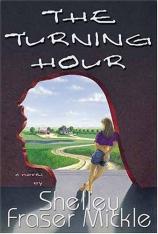Reading Group Guide
Discussion Questions
The Turning Hour

1. Of all the relationships that women have, mother-daughter relationships are among the most satisfying and the most complicated. Bergin and Leslie have shared many challenges and special times as mother and daughter within their changing family. What makes their relationship typical of most mother-daughter relationships, and what makes their issues and experiences different?
2. Leslie's father, Judge Bergin, was an extraordinary man-intelligent, warm, imaginative and loving. In many ways he stepped outside of the traditional male role. Do you think his being original and being so much a part of Leslie's childhood led her to expect too much from the other men in her life? Indeed, all the men in The Turning Hour are very different, and each relates to women in different ways. What does each of these relationships contribute to Bergin and Leslie's sense of who they are?
3. Leslie's own mother had trouble with alcohol-- which is usually associated with depression by either leading to the alcohol abuse or resulting from it-- and Leslie, herself, experienced post-partum depression, which affected her relationship with her husband. Years later, does it seem that this history of depression affected Bergin and Leslie's relationship?
4. What were the cultural influences that affected Leslie and Doug's relationship? Bergin and Luke's relationship? In what ways do cultural influences enhance relationships? In what ways do they complicate and harm relationships?
5. Suicide is such a complicated issue. It many ways, it always seems unbelievable. Yet, 500,000 young adults a year attempt suicide, one every one and a half hours. It is the third leading cause of death of our nation's young people. Why is it so difficult for us to believe that a young person would want to commit suicide? Would it have been easier to believe that Bergin would have tried to end her life had she been less gifted, less beautiful, less accomplished?
6. Leslie comments on Bergin and her friends by calling them The Black Fabric Generation. Many young people today have publicly stated they feel hopeless. Are there pressures and problems today that young people face which were not present in previous generations? Are today's challenges more difficult to meet than were the challenges of the 60s, 50s, etc.?
7. What was Bergin most afraid of losing? How did the loss of the relationship with Luke affect her relationship with her father and her fears about it?
8. Complicated concepts are explored in The Turning Hour that really have no one word to fully express them. These ideas and beliefs were what Bergin says were at the root of her reality, i.e., the way she saw the world. For instance, in the epigraph, the poem by Emily Dickinson, a mood is likened to a certain slant of light. Which were your favorite metaphors and images used to impart meaning to these difficult concepts and to express the feelings that Bergin was trying to describe?
9. What are the ingredients for Bergin's resilience? Which of these did Bergin have and where did she get them? Why weren't these strengths working for her at the beginning of the book?
10. Do the styles, which convey Leslie and Bergin's voices, convey their personalities? Do the broken sentences of Bergin's story enhance the sense of the state of her mind? Does it seem you are closely viewing her world with her, as if indeed, you are inside of her mind? Is literature perhaps the best art form to capture the way the human mind works?
11. The word "turning" is used as an echo throughout the book: being turned back physically from death, the darkness Bergin did not know how to turn away from, the fact that Jack was the one she was turning to in her darkest hour, etc. "Turning" implies movement and a connection with time. To what and to whom would you predict Bergin would turn in a future difficult time in her life?
12. The book is divided into two parts, and the last section is viewed from the present and told in the present tense. Why do you think the author chose to tell the story in this way?
The Turning Hour
- Publication Date: September 1, 2001
- Genres: Fiction
- Hardcover: 240 pages
- Publisher: Christian Voice Publishing
- ISBN-10: 0913515221
- ISBN-13: 9780913515228







